

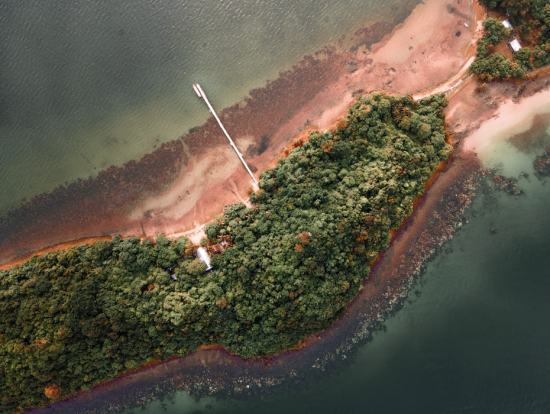
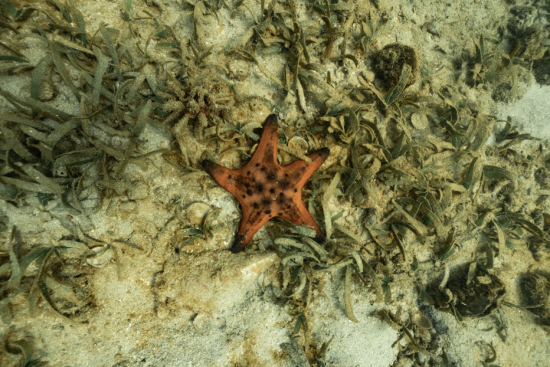
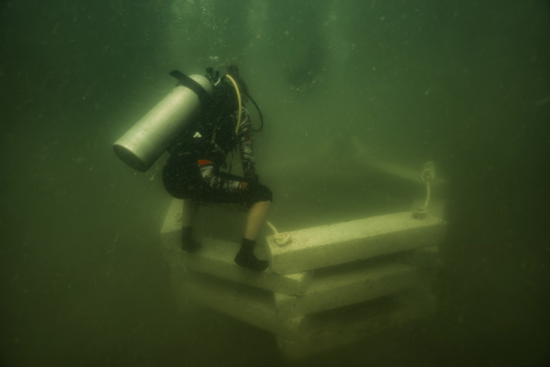
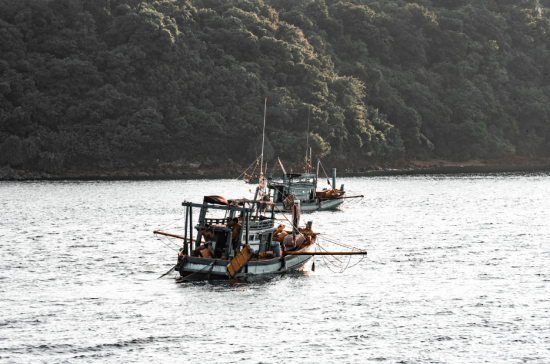
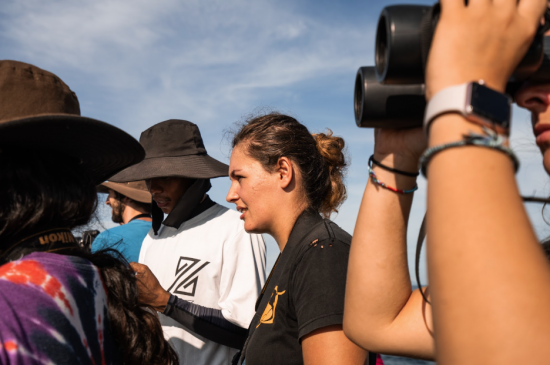
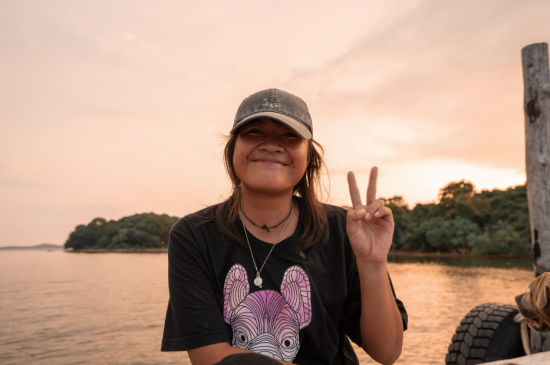
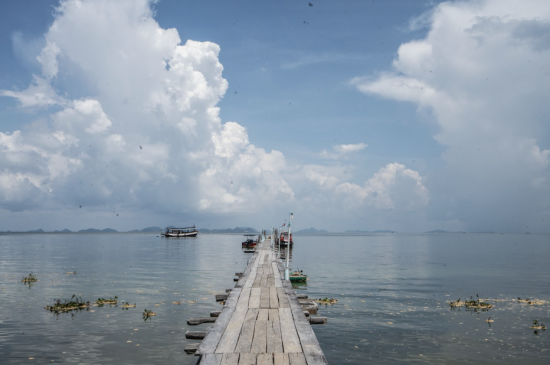
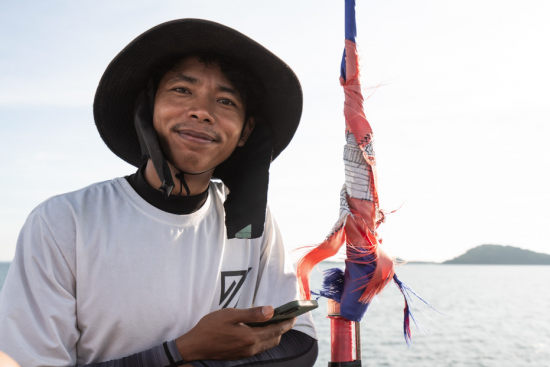
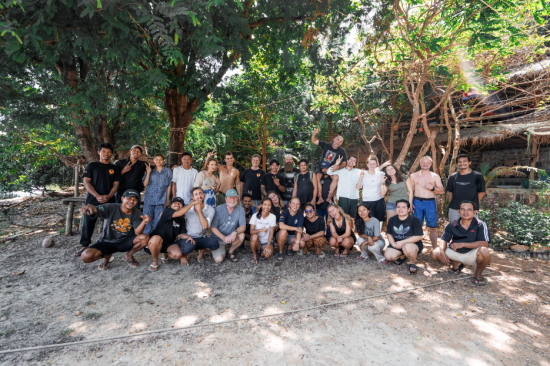
Following a grueling four-hour drive from Phnom Penh, we arrived in Kep, Cambodia. Though exhausted after our journey from Hanoi, Vietnam, our voyage was still far from over. Next, we were to embark on a boat ride out to the remote island of Koh Ach Seh, a crucial stop on our expedition.
Nestled near the border between Cambodia and Vietnam, the small landmass was the kind of hidden gem you only learn about through word of mouth. Our boat journey to the Kep archipelago was tranquil, gliding past quiet and uninhabited islands.
Far from the bustling streets of Phnom Penh, this was a place where isolation reigned supreme. Here, tourism was scarce, overshadowed by a stark reality. The ocean, once teeming with life, now bore the scars of relentless human exploitation. The scant tourism that existed paled in comparison to the prevalence of fishing operations. And not the sustainable, small-scale local kind of fishing, but rather the illegal kind that ravages marine ecosystems.
Arriving at Koh Ach Seh, the reality of our surroundings truly set in. The MCC handcrafted dock marked our entry into an ongoing battle spanning decades between this conservation team and illegal fishing operations. Even in broad daylight we could see fishing vessels on the horizon getting ready for their nocturnal plunders. Amidst this unsettling welcome, our attention shifted to the renegade team in front of us—a group who has dedicated their lives to halting this rampant destruction.
Their presence amidst such adversity was a powerful reminder of the tireless fight for marine conservation.
Upon our arrival, we were greeted by some of the leaders of this group of conservationists. There was Becky Chambers, who specialized in marine animal research, Tanguy Freneat, who was heading up the finances, Simon Retif, the cartographer, and Kem Mean, the Cambodian local team dolphin research lead. After brief introductions, the three proceeded to show us the island they are proud to call home.
Each member, with years of dedication under their belt, had firsthand experience of the gradual yet significant impact of MCC's work. Their long-term commitment highlighted the persistent and unwavering efforts required in marine conservation, a journey of consistent pushes towards change, and not the kind that happens overnight.
It was clear upon first impressions that this team marches to the beat of their own drum. And this beat was established back in 2008 when its founder, Paul Ferber, decided that it was his mission to preserve, conserve and protect Cambodia’s marine ecosystems. In a country where complexity layers every facet of environmental work—from bureaucratic red tape to financial hardship—establishing and sustaining an ocean-focused NGO is a Herculean task. Yet, this resilient group has persevered and remained unwavering in their commitment to this crucial cause.
Overcoming significant challenges, Paul and his dedicated team achieved a major milestone by establishing Kep's first Marine Fisheries Management Area (MFMA) in 2018. This achievement marked a turning point, enabling them to roll out key projects that have significantly benefited both the marine ecosystems and the local communities that rely on them.
Their groundbreaking work in deploying Conservation and Anti-Trawling Structures (CANTS) earned them the prestigious National Geographic Marine Protection Prize. These multifaceted structures are made of heavy hand-made concrete blocks on the island. When dropped into the ocean and assembled by a dive team, they promote water flow and encourage the growth of filter feeders. This offers sanctuary and habitat in areas devastated by bottom trawling.
The Shellfish Reef Restoration project came next, following the success of CANTS in facilitating the prosperity of marine life with the multifaceted importance of shellfish in these ecosystems. Their pilot project in Koh Ach Seh involved deploying the artificial CANTS to facilitate the rapid recovery of shellfish populations, crucial for protecting biodiversity and sustaining small-scale fishing communities.
Aside from acting as an artificial reef, these formations also prevent trawlers from coming into the area. The sturdy block structures have a huge impact on the nets that drag along the seafloor based on the way they are designed and deployed.
Yet, MCC's efforts extend beyond habitat restoration. The Marine Harvesting Network Project was initiated to monitor and protect small-scale, sustainable fishing practices within the Kep MFMA. This project is crucial for coastal communities reliant on marine resources for food security and livelihoods. Illegal, unreported and unregulated fishing activities, particularly bottom trawling, wreak havoc on vital ecosystems and indiscriminately captures marine life, leading to high bycatch rates and devastating impacts on small-scale fisheries.
By monitoring fishing pressure and the extent and range of different fishing activities, the team can provide regular updates to the Cambodian government. They also strategize enforcement approaches, conservation measures and how to best manage the marine protected area with authorities once armed with this data and insight. With close to 80% of the illegal trawling resulting in bycatch, this project is mission critical on so many levels.
MCC's commitment to protecting marine mammals is equally commendable. Launched in 2017, the Cambodian Marine Mammal Conservation Project focuses on safeguarding endangered marine mammals, primarily the Irrawaddy dolphins and dugongs. This pioneering research project is crucial for delineating and safeguarding key habitats and has made significant strides since its inception, conducting numerous surveys, training marine mammal observers and achieving IUCN-IMMA status.
Becky and Kem Mean are at the helm of this project, and took us out for a dolphin survey. They tempered our expectations, reminding us that sightings were a matter of luck. Undeterred, we embarked with an open mind, and to everyone's surprise, within an hour, we found ourselves amidst multiple dolphin pods. This rare occurrence, the first-of-its-kind in years, served as a vivid testament to the positive impact of MCC's conservation efforts.
The Cambodian Seagrass Conservation Project is another effort, aiming to conserve and expand seagrass meadows. These habitats are pivotal for carbon capture and support 20% of fisheries worldwide. This project evaluates the extent of seagrass meadows and assesses ecosystem recovery in MCC's anti-trawling protected areas. With the realization of the vast and diverse seagrass meadows in Cambodia, the team has put more effort and humanpower behind implementing specific management strategies to preserve this habitat.
Guided by Simon's expertise, the team embarked on an extensive survey of the MFMA, meticulously conducting over 5,000 scheduled free dives. Every 250 meters, they diligently recorded their observations, creating a comprehensive database of the underwater landscape. This detailed mapping covered everything from coral reefs and seagrass beds to barren patches. Simon described the endeavor as a "massive effort," which honed the team's skills in single breath holds, heightened their ocean awareness, and reinforced their commitment to safety.
At the core of MCC's approach is the understanding that all their projects are interconnected, beginning with the successful implementation of the CANTS program. This initiative set the stage for broader conservation efforts, including their active studies and management of marine mammals, seagrass and fish stocks. Their work underscores the importance of a holistic approach to conservation. Rather than focusing narrowly on individual projects or species, MCC looks at the entire marine ecosystem, identifying areas where their assistance can have the most significant impact.
But it wasn’t until we met Rachana Thap, MCC's Executive Director, that opened our hearts and minds to the full scale of the work tackled here. Described by Paul as someone who "washed up on shore" and never left, Rachana embodies the spirit of intersectional environmentalism in Cambodia.
Rachana's commitment to this ideology illustrates how environmental efforts in Cambodia are deeply intertwined with broader social issues, making their conservation work not just a fight for nature, but also a pursuit of equity and justice. The concept is grounded in the understanding that environmental degradation and social inequalities often disproportionately affect marginalized communities—including indigenous peoples, women, the underprivileged and other groups facing systemic disadvantages. And in this case, we are referring to the fishing communities of the Kep and Kampot regions.
She walked us through how MCC is actively responding to the critical issue of declining fisheries resources by pioneering alternative livelihood solutions for local communities. This strategic approach involves a deep dive into the intersection of their extensive marine data and socio-demographic analysis. By understanding the unique needs and capacities of local communities, MCC is identifying, fostering and helping to implement sustainable livelihood opportunities.
These alternatives are not just mere replacements for traditional fishing practices; they are innovative, ecologically sound and economically viable options that align with the communities' cultural and social traditions. According to Rachana, initiatives are carefully designed to reduce the communities' reliance on destructive fishing practices, and include aquaculture, eco-tourism and other marine-related enterprises.
The focus on creating alternative livelihoods offers a dual benefit: protecting the marine environment from harmful practices and improving the socio-economic status of the communities that depend on it. This holistic approach ensures that conservation efforts are not seen as a threat to local livelihoods, but as an opportunity for growth and sustainability.
Every evening, we found ourselves at the edge of the dock, gazing out over the sea as the sun dipped below the horizon. There, alongside newfound friends, they shared heartfelt stories of their journeys. They spoke passionately about their work, the reasons behind their dedication to marine conservation, and the tangible progress achieved from years of toiling together on the remote island of Koh Ach Seh.
Tanguy's reflections painted a vivid picture of his early days at MCC. Arriving as an intern in 2016, he recalled the frequent sight of 5-6 active trawlers during his trips to the mainland. He spoke of beaches littered with seagrass and creatures entangled in nets that he hadn’t even seen on dives. Meanwhile, Simon's aspirations centered on expanding the deployment of artificial reefs through CANTs, aiming to benefit Cambodian communities beyond Kep and Kampot.
While the battle against destructive fishing practices is far from over, there are clear signs of success.
Initially, the team didn't expect to see significant results for a decade or more. Yet, to everyone's surprise, positive changes began to materialize much sooner than anticipated. The resurgence of dugongs, a marked increase in dolphin populations, and the expansion of seagrass beds are just a few examples of the inspiring outcomes MCC has achieved.
As Rachana put it, their success is not just a local phenomenon. The strategies and lessons learned here are being replicated and adapted along the Cambodian coastline, spreading hope and proving that concerted efforts can yield substantial environmental improvements.
One of the most heartening experiences for us was witnessing the enthusiasm and satisfaction in the eyes of the volunteers. Each person, regardless of their background or skill set, contributed an essential piece to the larger puzzle of conservation. Living on a remote, faraway island, despite its challenges and limitations, offers a daily, tangible connection to the cause—a stark contrast to the disconnect often felt in more traditional office settings found in Phnom Penh.
MCC's approach reinforces the idea that you don't need a specific background or expertise to make a difference. A willingness to learn and an open attitude are the most crucial qualities. This philosophy breaks down the barriers of 'traditional pathways,' inviting a diverse range of people to contribute their unique skills and perspectives—from accountants and geographers to dive instructors and ocean lovers.
As Kem Mean put it, this group encourages anyone interested to reach out, ask questions, and explore the variety of programs they offer. That’s how he got here in the first place. There's a recognition that a 'one size fits all' approach doesn't work in conservation, and the diversity of experiences and viewpoints is what drives innovation and progress.
For those considering a journey into conservation, MCC's story is a reminder that such a path doesn't close doors but opens up a world of possibilities. Engaging in this work can lead to a fulfilling and simple existence, one that doesn't hinge on the comforts and conventions of the modern world. It's a testament to the idea that with passion, commitment and a community of like-minded individuals, significant environmental change is not just possible, but already happening.
Our experience with MCC was transformative, reshaping our perspectives on what it means to live with purpose and contribute positively to the planet. It's a viewpoint we'll carry with us as we continue to explore consciously around the edges of earth, ever mindful of the profound difference a dedicated group of individuals can make.
 Andi
Andi 30th April 2024
30th April 2024